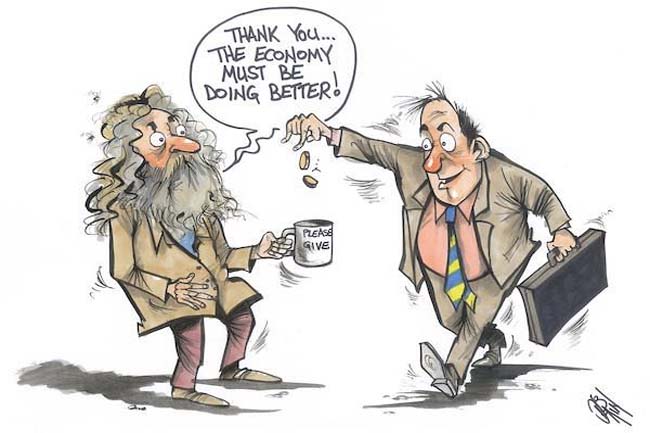Dr Steven Hail discusses universal basic income versus genuine job guarantee schemes to offset accelerating technological change and rising inequality.
WE LIVE IN AN ERA of inequality, relative poverty, social exclusion, insecurity and underemployment.
We are told that accelerating technological change will wipe out millions of jobs and drive us even further towards a society of "haves" – in their well-paid jobs made productive by cheap, robotic work-mates and "have-nots" driven out of paid employment by the androids.
For many, the obvious answer to all this is a universal basic income (UBI) — an unconditional payment made to all adults, so that they can still function as consumption machines and at least survive – even though there are no jobs left for them to do.
What is universal basic income? Source: CNBC.
In a sense, a UBI can certainly be afforded by currency-issuing governments. Those governments are hardly going to run out of the currencies they issue.
But there are some problems with a UBI:
- To avoid inflationary consequences, a UBI would either need to be set very low and at poverty levels or would require increases in taxation on those still in work, which would be politically unpopular and perhaps infeasible.
- There is overwhelming evidence, from psychological, sociological and economic research using large panel data sets, that involuntary unemployment has serious non-pecuniary effects on well-being. In other words, if you take someone’s job away and replace the income they have lost, then in most cases their subjective well-being falls dramatically.
- A UBI has no counter-cyclical element. Unlike a job guarantee scheme, or income-related welfare payments and taxes, spending on a UBI would neither rise in a recession nor fall in an inflationary boom.
While some small-scale experiments with unconditional income payments have been undertaken in some places, they are not a fair test of an economy-wide UBI. There has been no real test of a UBI as a tool of public policy. You cannot say the same thing about job guarantees, with job guarantee-like programs having been used with success on a very large scale in India (ongoing) and in Argentina (2002-5), and many smaller scale projects, which have been, nonetheless, larger than any UBI trials.
One of the earliest enthusiasts for a UBI was the Chicago boy, Milton Friedman. There is a long list of billionaires and other capitalists, including low-wage employers, who favour a UBI. To them, it is a way of saving government spending on welfare — a subsidy to low-wage employers; a way of incentivising the poor to take very low-wage jobs and a sop to the poor in societies who have lost any claim to social equity and inclusiveness.
Let them eat cake — they can buy it with their UBI.
You can read more by Dr Steven Hail at erablogdotcom, follow him on Twitter @StevenHailAus, as well as on Facebook at Green Modern Monetary Theory and Practice.

This work is licensed under a Creative Commons Attribution-NonCommercial-NoDerivs 3.0 Australia License
Monthly Donation
Single Donation
Get the detail. Subscribe to IA for just $5











